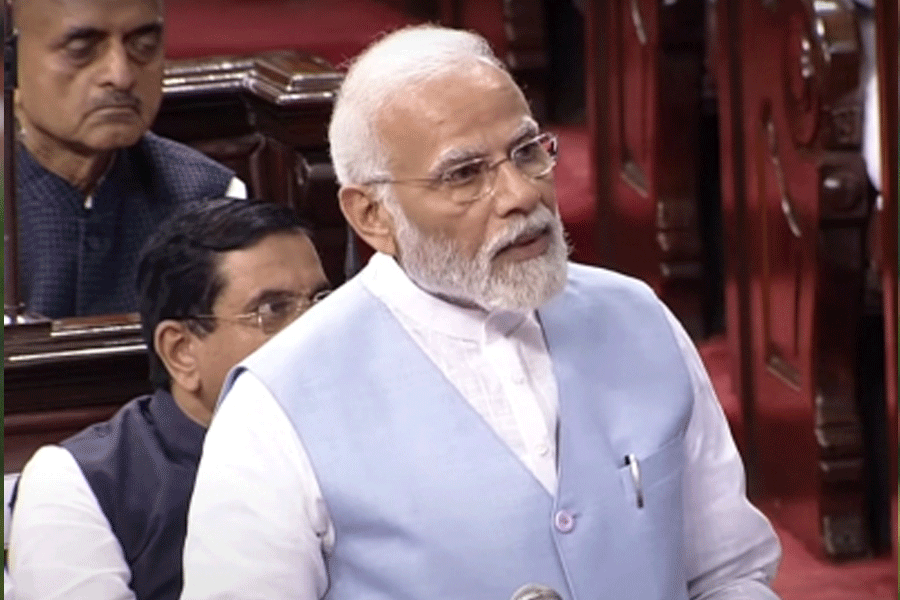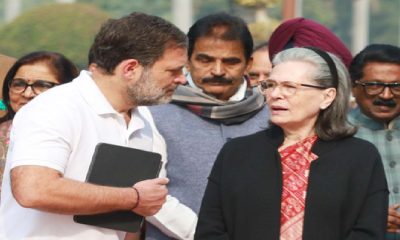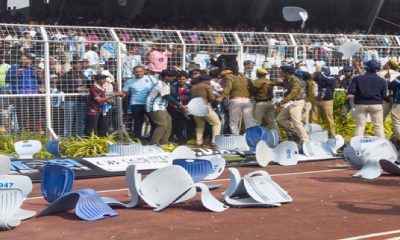National News
For many years after Independence, there was no long term vision in health sector: PM

Prime minister Narendra Modi on Monday claimed that for several decades after Independence, there was a lack of an integrated approach and long term vision in the health sector.
“For several decades after Independence, there was a lack of an integrated approach and a long-term vision in health. We have not kept healthcare restricted only to the health ministry, but have emphasised on the whole of the government approach,” he said while addressing a webinar on “Health and Medical Research”.
It has been the endeavour of the Centre, to make medical treatment affordable in India, the Prime Minister added.
“That has been the thought behind providing free medical treatment of upto Rs 5 lakh under the Ayushman Bharat scheme. Under this, approximately Rs 80,000 crore, that would’ve been spent on medical treatments, were saved,” he said further.
For serious diseases, quality and modern health infrastructure in the country is important, the PM said.
Government’s focus is also on ensuring that people get testing facilities near their homes and there are better facilities for first aid, he added.
For this, he said, 1.5 lakh health and wellness centres are being prepared in the country, the prime minister informed.
Referring to the Coronavirus pandemic, the Prime Minister said that it showed that when such a crisis occurs, even developed systems of prosperous nations collapse.
“World is now much more focussed on health. But India’s approach is not restricted to healthcare, we’re also working on ensuring wellness,” he added.
“Corona also taught us that supply chain has become a very important matter. When the pandemic was at its peak, for some countries even life-saving things like medicines, vaccines, and medical devices had become weapons,” the Prime Minister noted.
Reminding the audience that India helped many nations by providing vaccines to them, he said, “That’s why we have kept a vision before the world – ‘One Earth, One Health’ – holistic healthcare for everyone.”
National News
Debt-ridden farmer selling kidney is disgrace to Maharashtra’s conscience, says Shiv Sena(UBT) in ‘Saamana’

Mumbai, Dec 18: Shiv Sena Uddhav Balasaheb Thackeray (UBT) on Thursday launched a blistering attack on the Mahayuti government following reports of a debt-ridden farmer from Maharashtra allegedly selling his kidney in Cambodia to repay moneylenders.
The party mouthpiece ‘Saamana’ editorial, titled “The Disgrace of the Soil”, described the incident not just as a crime, but as a “stain on the conscience of a state that calls itself progressive”.
The Thackeray camp, by linking this tragedy to the upcoming municipal elections, warned the “Marathi Manoos” that a government that cannot protect the physical integrity of its farmers cannot be trusted to protect the capital of the state. “Today it is a kidney; tomorrow, if these looters are not stopped, they will put the entire state up for auction,” it claimed.
The editorial highlighted the harrowing case of Roshan Sadashiv Kude, a farmer from Chandrapur in the Vidarbha region. After suffering total crop failure on his four-acre plot and losing his cattle to disease, Kude fell into a debt trap. Despite selling half his land, his tractor, and household belongings, he remained unable to meet the extortionate daily interest demands of Rs 10,000 imposed by local moneylenders.
The editorial noted with horror that it was the moneylender who allegedly “advised” and facilitated the farmer’s journey to Cambodia to sell his organ. “In the land of Chhatrapati Shivaji Maharaj, where farmers should be protected, they are being auctioned piece by piece in foreign lands,” claimed the editorial.
The Thackeray camp has accused the state administration of being “intoxicated by power” while ignoring the rural crisis. It pointed out that while the government is busy with “event management” and announcing pre-election schemes (Government Resolutions), the agricultural backbone of the state is collapsing. “The Deputy Chief Minister speaks of ‘New Maharashtra,’ but in this ‘New Maharashtra,’ a farmer has to cross international borders to sell his kidney to keep his family alive. The “administrative dacoity” regarding municipal looting has now extended to the very bodies of the poor,” it alleged.
The editorial slammed the police administration, saying that had it taken the action against the four money lenders, who have now been under arrest, in time, the farmer’s life could not have been devastated. At the national level, farmers are reeling under a debt burden of a whopping Rs 12 lakh crore, of which farmers from Maharashtra are bearing the burden of Rs eight lakh crore. It is so ironic that the Centre, which writes off the debt of industries, is not giving much-needed relief to farmers by providing a crop loan waiver, which is forcing the farmers to commit suicide.
According to the editorial, Chief Minister Devendra Fadnavis had given a promise of crop loan waiver before the state Assembly elections, but now he has forgotten it after assuming power.
The Thackeray camp has demanded an immediate and “merciless” action against the moneylenders and the international syndicate involved in the kidney racket.
It has called for a high-level probe into the international organ trafficking links between Maharashtra and Cambodia, a debt waiver and an immediate audit of private moneylending practices in Vidarbha and Marathwada. The Uddhav Thackeray-led Shiv Sena has demanded the resignation of the Agriculture Minister over this failure of the state’s safety net.
Crime
Mumbai Emerges As Main Hotspot For Gold Smuggling Through Airports: DRI Report

Mumbai: The Directorate of Revenue Intelligence, in its report, stated that gold smuggling in the year 2024–25 remained concentrated in hotspots like Maharashtra, Tamil Nadu, Gujarat and West Bengal, serving as entry points or redistribution hubs due to their strategic location, higher number of flights and transit routes.
In 2024–25, the DRI seized 1,073 kg of gold having a market value of approximately Rs 785 crore, the report stated. Mumbai emerged as the main hotspot for gold smuggling through airports, far surpassing all other locations in both the quantity of gold seized and the number of cases detected, the agency stated in its report.
According to the DRI, gold smuggling syndicates operate through a structured network: masterminds located abroad or in India fund operations, organisers recruit carriers, carriers transport concealed gold into India, and handlers receive gold for delivery to key members of the network in India for further sale.
Sometimes, gold smuggled in forms other than foreign-origin bars, such as wax or jewellery, is melted into 24-carat bar form at illicit facilities, sold domestically, converted into jewellery and integrated into domestic markets. Proceeds are usually repatriated abroad via hawala or illegal forex channels, sustaining a multi-layered, highly networked smuggling operation.
“Air routes, especially flights from the Middle East and Southeast Asia that connect to metro and Tier-II airports, are the primary channel for gold smuggling into India. Smugglers exploit diverse passenger profiles, including women, families and airline crew, to smuggle gold into India. Increasingly, smugglers are also concealing gold inside aircraft cavities for later retrieval by crew, passengers or airport staff. Sometimes, gold concealed in the aircraft during the international leg is retrieved by passengers during the domestic leg of the aircraft. Further, transit passengers smuggle gold via body concealment and hand it over to airport staff,” the report stated.
“A more sophisticated and dangerous method involves concealing gold inside the human body. Syndicates mould gold in wax form into small capsules, which are then inserted into body cavities to evade detection by scanners and manual checks. This trend reflects a growing shift towards high-risk concealment techniques that endanger the carrier’s health,” stated the report.
“The gender profile of gold smuggling carriers for 2024–25 revealed that the majority of individuals apprehended were male. However, the presence of women, making up one-tenth of the persons apprehended, highlights a growing trend of female involvement, possibly due to perceptions of lower suspicion during checks. The domicile profile of gold smuggling carriers in 2024–25 indicates that the overwhelming majority were Indian nationals, which highlights the dominance of domestic carriers in gold smuggling. Carriers from Kenya and Iran contributed modestly, with isolated cases involving carriers from Thailand, Turkey, Afghanistan, Oman, the UAE and the USA,” the report further stated.
Business
India reaches 709 million active UPI QRs, logs 59.33 billion transactions in July-Sep

Mumbai, Dec 18: The unified payments interface (UPI) transaction volumes rose 33.5 per cent (year-on-year) to 59.33 billion transactions in the July-September period, as transaction value grew 21 per cent to Rs 74.84 lakh crore, a report showed on Thursday.
India reached 709 million active UPI QRs, marking a 21 per cent increase since July 2024. Dense QR acceptance across kiranas, pharmacies, transport hubs, and rural markets has made scan-and-pay the default payment mode nationwide, according to the report by Worldline India.
Person-to-merchant (P2M) transactions continued to outpace person-to-person (P2P), reflecting UPI’s dominance in everyday retail payments.
P2M transactions were up 35 per cent to 37.46 billion transactions while P2P transactions rose 29 per cent to 21.65 billion transactions, the report said.
The third quarter (Q3 2025) further reinforced India’s position as the world’s most dynamic real-time payments economy — where every scan, tap, and click is reshaping consumer and merchant behaviour.
The average ticket size declined to Rs 1,262 (from Rs 1,363), highlighting increased usage for micro-transactions such as mobility, food, healthcare essentials, and hyperlocal commerce.
Point of sale (PoS) terminals grew 35 per cent to 12.12 million (July 2024–July 2025). Bharat QR stood at 6.10 million, witnessing marginal decline amid the shift toward UPI QR dominance.
Private banks led acceptance deployment, accounting for 84 per cent market share. While credit card issuance grew by 8 per cent (on-year) to 113.39 million cards, debit cards reached 1.02 billion and prepaid cards stood at 470.1 million.
Credit card transactions grew 26 per cent to 1.45 billion, with transaction value at Rs 6.07 lakh crore. Debit card transactions declined 22 per cent, reflecting migration of low-ticket spends to UPI, the report showed.
Mobile and tap-based payments continued to accelerate, with contactless adoption gaining momentum across metros, mobility services, and quick-service retail.
“The outlook for Q4 2025 and early 2026 points to accelerated innovation and deeper ecosystem integration. Interoperable QR is expected to move from pilot phases to everyday usage across mobility, healthcare, fuel stations, and public utilities—delivering a unified scan-and-pay experience,” the report mentioned.
-

 Crime3 years ago
Crime3 years agoClass 10 student jumps to death in Jaipur
-

 Maharashtra1 year ago
Maharashtra1 year agoMumbai Local Train Update: Central Railway’s New Timetable Comes Into Effect; Check Full List Of Revised Timings & Stations
-

 Maharashtra1 year ago
Maharashtra1 year agoMumbai To Go Toll-Free Tonight! Maharashtra Govt Announces Complete Toll Waiver For Light Motor Vehicles At All 5 Entry Points Of City
-

 Maharashtra1 year ago
Maharashtra1 year agoFalse photo of Imtiaz Jaleel’s rally, exposing the fooling conspiracy
-

 National News1 year ago
National News1 year agoMinistry of Railways rolls out Special Drive 4.0 with focus on digitisation, cleanliness, inclusiveness and grievance redressal
-

 Maharashtra1 year ago
Maharashtra1 year agoMaharashtra Elections 2024: Mumbai Metro & BEST Services Extended Till Midnight On Voting Day
-

 National News1 year ago
National News1 year agoJ&K: 4 Jawans Killed, 28 Injured After Bus Carrying BSF Personnel For Poll Duty Falls Into Gorge In Budgam; Terrifying Visuals Surface
-

 Crime1 year ago
Crime1 year agoBaba Siddique Murder: Mumbai Police Unable To Get Lawrence Bishnoi Custody Due To Home Ministry Order, Says Report






















